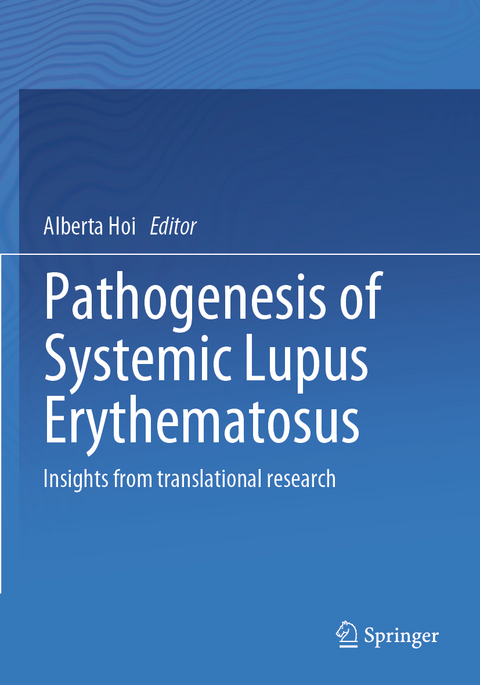
Pathogenesis of Systemic Lupus Erythematosus
Springer International Publishing (Verlag)
978-3-030-85163-7 (ISBN)
This book will critically appraise the current understanding of important immunological pathways that contribute to the pathogenesis of lupus. We will review the role of interferons as part of the innate immune defects that perpetuate the loss of self-tolerance in SLE. B cell hyperactivity, as a defining hallmark of SLE, and different strategies of B cell targeted therapy will be discussed. The role of co-stimulation or immune checkpoint molecules in activating B and T cells will be reviewed, as well as other cytokines that serve in the amplification loop promoting a more proinflammatory Th1 or Th17 responses. Intracellular targets, such as signaling molecules in the JAK/STAT pathway, or a variety of kinases and proteasomes, can cause a cascading downstream effect of transcriptional responses that are important in SLE.
Immune homeostasis can also be restored by bolstering the naturally occurring anti-inflammatory mechanisms. Glucocorticoid, as a potent natural anti-inflammatory hormone, can mediate its effects by recruiting histone deacetylase that serve to repress gene transcription. Glucocorticoid-induced leucine zipper is a gene upregulated by glucocorticoid that can be a potential target for development of anti-inflammatory strategy. Finally, T regulatory cells can be utilized to help restore to immune tolerance and are amongst the latest focus of therapeutic development in SLE.
Associate Professor Alberta Hoi is a rheumatologist, leading lupus expert and translational researcher in Australia. Her research focusses on disease predictors and outcomes, registry design and implementation, quality of care and patient-centred interactions.
She has received her undergraduate medical degree from Melbourne University (1996), and completed a doctoral of philosophy in immunology on a NHMRC scholarship from Monash University. She is a fellow of the Royal Australasian College of Physician and member of the Australian Rheumatology Association (ARA). Her current clinical activities include seeing patients at Monash Lupus Clinic, where she serves as the Clinic Head, as well as Complex Rheumatology Clinic at Monash Health, and Autoimmune Clinic at Austin Health.
She is a chief investigator and senior research fellow at the Centre for Inflammatory Diseases, School of Clinical Sciences Monash University. She has developed core set measurements and studied factors that determine optimal outcomes in SLE, and she was pivotal in the successful roll out of the Australian Lupus Registry & Biobank, a national disease registry that serves as a valuable research resource, that foster collaboration between translational scientists and clinicians at national and international levels.
Associate Professor Alberta Hoi plays an active role in a number of investigator-initiated SLE studies and clinical trials. Currently she is the chair and custodian of the Australian Lupus Registry & Biobank Steering committee. She is also on the executive committee and a founding member of the Asia-Pacific Lupus Collaboration (APLC). She serves on an honorary basis as the treasurer for the Victorian branch ARA and the Australian Chinese Medical Association Victoria.
Advances in translational science to identify new therapies for systemic lupus erythematosus.- Hallmark of systemic lupus erythematosus: Role of B Cell Hyperactivity. Fabien B Vincent, William A Figgett and Margaret L Hibbs.- B cell targeted therapies in systemic lupus erythematosus.- Type I Interferons and the perpetuation of a loss of tolerance.- Therapeutic Modulation of the Interferon Pathway in Systemic Lupus Erythematosus.- The concept of co-stimulatory blockade in SLE.- Cytokines: their role in amplifying SLE pathogenesis.- Intracellular targets in SLE.- Regulatory T cells in SLE.- Balancing strategies: GC and GILZ Axis.
| Erscheinungsdatum | 18.11.2022 |
|---|---|
| Zusatzinfo | XXI, 178 p. 36 illus., 24 illus. in color. |
| Verlagsort | Cham |
| Sprache | englisch |
| Maße | 178 x 254 mm |
| Gewicht | 384 g |
| Themenwelt | Studium ► Querschnittsbereiche ► Infektiologie / Immunologie |
| Naturwissenschaften ► Biologie ► Zellbiologie | |
| Schlagworte | B-cells depletion • cytokines • Immunoproteasomes • Interferons • JAK/STAT signaling • Small molecule inhibitors • Th17 • T regulatory cells |
| ISBN-10 | 3-030-85163-X / 303085163X |
| ISBN-13 | 978-3-030-85163-7 / 9783030851637 |
| Zustand | Neuware |
| Informationen gemäß Produktsicherheitsverordnung (GPSR) | |
| Haben Sie eine Frage zum Produkt? |
aus dem Bereich


